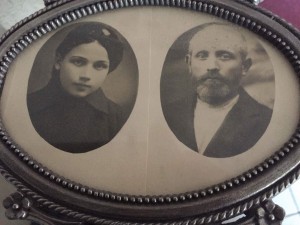
Note: This is a postscript to my Saturday series, in which I, with crowdsourcing help, try to unravel the mysteries hidden in previously unknown letters written by my mysterious step-great aunt Dvora /Dora before and during WWll in Poland. For further explanations see previous post
Translations ascribe meaning.
The trouble is when different people translate the same letter and ascribe different meanings, or at least a different tone to the text.
Among the letter found from Poland (Belarus today) was a letter from Dora’s father, Nachum (Nochim) Meir. The letter is dated April 5th, 1936. It was written to the daughter Libby (in New York) in Yiddish, in very small and difficult to read handwriting, without punctuation marks. It caused difficulties for all who tried to read it. Which only adds to the confusion.
Here are a few examples.

- One version of the translation claims the letter begins: “I am writing you dear daughter but you will not have pleasure from my letter, because I am writing you now to unburden myself, as they say, as I do not have one good friend. This is why I’m writing to you, you will understand me. I am carrying around a bitter heart from everything”. The other versions claim that the father is writing NOT to unburden himself from all the distress and pain in his heart but just so his daughter will understand him.
- The next issue is more conflicted. All five of Nachum Meir’s children from his late first wife fled their childhood home with the terrorizing step-mother, and immigrated. Tales passed down the generations tell of a father who never stood up for his children or noticed that they were being underfed, denied proper clothing for the severe winters and generally mistreated. The question is, did he regret all of that? One version claims he wrote that he feels so bad because he knows he was the worst father in the world. It sounds like a true apology. However, in another translation he sounds like the stereotypical Jewish mother blaming the offspring: “It seems that I am indeed the worst father in the world, as the children do not want to know what I am doing and how I live. Especially since one son and one daughter have children of their own, therefore it should not be like this”.
- All translators agree in regards to the only mention of Hitler in all of these letters – he wishes his poor health and troubles on Hitlers’ followers.

- Another source of conflicting information is in regards to Dora, whose letters we read. All versions agree that the father is asking for money for his sick wife and for Dora’s schooling. On the one hand, from one version of the translation and from Dora’s letters it seems that she is studying in a high-school (Gymnasium): “ …( cut part) Dora another two years in the gymnasium. Her studies will be finished and then she will earn money. She already earns money now, she has some lessons. For the first lesson she took only two dollars (why would he write about dollars??!), then she immediately got another one…I hope she will be able to earn but she must finish the gymnasium in two years.” We do know from Dora’s letters that she graduated in 1938 but she mentions working for money only starting that year. She doesn’t say doing what. A different version of the translation claims that money is needed to pay the tutor who teaches Dora so that she can graduate. No Dora tutoring anyone. Perhaps “pay the tutor” is the same as paying the school?
Was he a contrite father writing for help or did he feel unjustly treated by his fleeing offspring? I want to believe the former because of this sentence (only one translator figured it out): “In life you always make mistakes and the world is such that you always hurry and you run and you stop for nothing and die like a fool”.
I guess I’ll never know.
Very sad, no matter how you look at it.